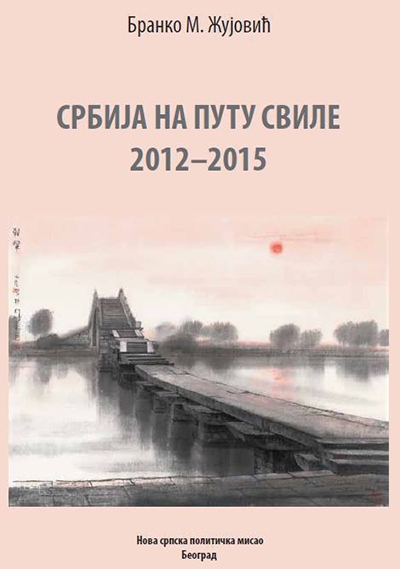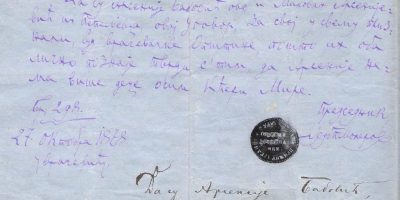BOOKS REVIEW: SERBIA ON THE SILK ROAD


Branko Žujović, Srbija na putu svile [Serbia on the Silk Road]. Nova srpska politička misao, Belgrade, 2015.
A book „Serbia on the Silk Road“ by the journalist and publicist Branko Žujović offers a plenty of historical, social, and above all economic data about the biggest and most ambitious undertaking of the Peoples Republic of China (PRC) in the 21st century. In its 12 sections, this smoothly read book also points out the benefits of the Chinese project for Serbia, relations between the two countries, and in respect to the Serbian emotional question of Kosovo and Metohija, the policies of Beijing regarding the secessionist province of Taiwan.
Žujović, a longstanding journalist in the Serbian section of the China Radio International (CRI) in Beijing, reminds that the President of the PRC Xi Jinping proposed in September 2013 an initiative called „Economic Belt Silk Road“ (SREB) stretching via Central Asia to Europe. The next month, President Xi proposed the Maritime Silk Road (MSR) for the 21st century, connecting ports down the Chinese coast with other Asian countries, East Africa, Middle East and the Mediterranean. In the PRC the combination of the two initiatives is called “One Belt, One Road“ (OBOR).
Žujović ascertains that the PRC is searching for global space so that it can continue dizzying economic growth and becoming what is in Beijing called wellof society. Cheap goods (“Made in China”) have been replaced by products and services of high technologies and significant value added, which are supposed to be sold all over the world.
For the time being investments from the PRC in infrastructure projects are the basic of OBOR, which is, otherwise open for every country. The PRC inaugurated a $40 billion Silk Road Fund, and the sources from the recently established Asian Infrastructure Investment Bank (AIIB) with planned capital of $100 billion will be at disposal. Chinese Development Bank announced that it will invest more than $890 billion in more than 900 projects.
But Žujović warns it is a big question how the powers along the OBOR will coordinate their interests. The European Union is on the far West, Russia with Eurasian Economic Union partly on the West, on the North and in the central regions of Asia, India and Pakistan on the South, Turkey on the Southwest, and the USA is a global player…
Accordingly, despite good economic motives, it is not possible to consider building SREB out of a geopolitical frame. Žujović quotes western analysts who are inclined to emphasize that the result of the initiative for OBOR could be spreading the Chinese soft power in Eurasia.
Žujović draws attention to the fact that, up to now, cooperation with the PRC has been perceived in Serbia through infrastructural investment, and gives a long list of examples. On the other side, Chinese projects in Serbia, like the bridge Zemun-Borča, have become, to a certain extent, references for the constructing companies of the faraway country in European lands which need a lot of such projects. That is the reason why Belgrade has been mentioned as a possible seat of Chinese infrastructural investments in Central and Eastern Europe (CEEC). Žujović many times raises the question: Where is Serbia’s place, within the complicated geopolitical and economic integrations in Eurasia, in cooperation between the PRC and CEEC, the so-called format “1+16”? The author offers the responses in this book published last October by the media house „New Serbian Political Thoughts“ (NSPM).
Substantial quantities of goods from Piraeus, a port of entry for Chinese products to Europe, have been transported by rail down the Morava-Vardar direction and further north through the Danube Valley towards Hungary, the Czech Republic and other states of the CEEC. That is the most convenient continental link between the Aegean Sea and Central Europe. It is of utmost importance for Chinese economic initiatives and trade from Piraeus, one of the final destinations of the MSR. “That is a huge chance for Serbia, since it plans, in cooperation with the PRC, to modernize and upgrade the railway line Belgrade-Budapest, primarily because of the potentials of the port of Piraeus”, noticed the author.
But, according to Žujović, there was no significant response in Belgrade to Chinese Prime Minister Li Keqiang’s calls to the companies from CEECs to his country’s market, particularly the agricultural and food products. Serbia should have an ambition to export its agricultural and other food products of good quality, especially to the PRC where they will enjoy higher prices, emphasizes Žujović.
Žujović argues that the tourism industry should not be forgotten too, because that sector is already important in cooperation between the PRC and CEECs. But, Serbia and other Balkans countries, proportionally, receive less Chinese visitors.
The author devotes particular attention to bilateral relations between the PRC and Serbia. As a big Asian country, the PRC is the only permanent member of the United Nations Security Council who never voted against the interests of Serbia. An important bond between the two countries is also a support of the official Beijing to the territorial integrity of Serbia, which is of practical and principle nature, stresses Žujović.
Žujović also points out that the situations regarding Taiwan and Kosovo and Metohija are similar only at first glance. While a majority of the local population in Kosmet are ethnic Albanians, Taiwan is inhabited by Chinese, who mostly have patriotic orientation. Taiwan is also, in contrast to Kosmet, well established and orderly society with efficient economy. The exchange between mainland China and Taiwan was valued at $198,31 billion in 2014. Under such circumstances, Belgrade should not count too much on Taiwan`s example in argumentation of the Serbian stand vis–à–vis its southern province, concludes the author of the book „Serbia on the Silk Road“.
Borislav KORKODELOVIĆ
THE REVIEW OF INTERNATIONAL AFFAIRS BELGRADE, VOL. LXVII, No. 1161, JANUARY–MARCH 2016
Related News

Srbija u Vračeviću
Branko M. Žujović, „Vračević – prilozi za istoriju sela“ (2014) Vračević kod Mionice samo jePročitaj više

Radovan Beli Marković: BRANKO ŽUJOVIĆ TELEVIZIJI „NA CRTU“
O neobjavljenoj zbirci reportaža „Marko Polo je sklopio Njujork tajms“ Žujovići, čuvena familija iz Vračevića,Pročitaj više
